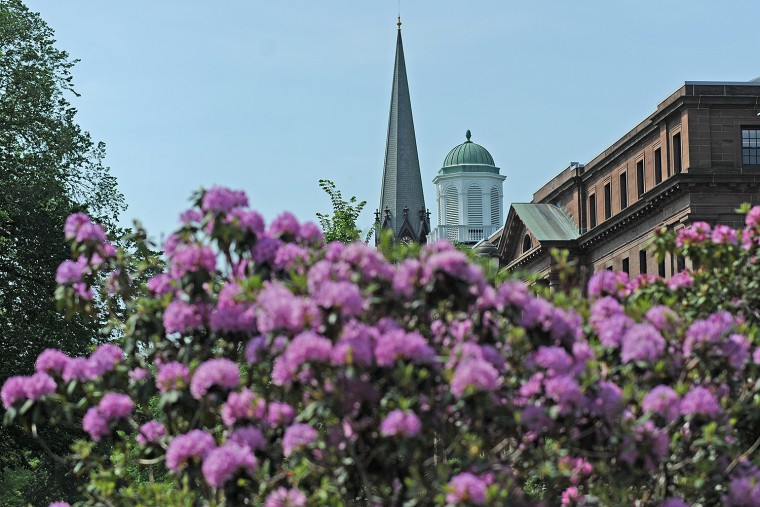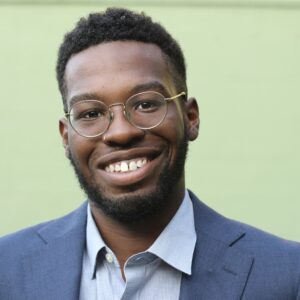New Survey Lab to Explore Political and Cultural Issues

A new Survey Lab led by Steven T. Moore, assistant professor of government, will have the opportunity dig deeply into public opinion to learn how and why Americans think the way they do about political and cultural issues.
“This is one of the more exciting parts of my job. We’ve got all kinds of theories on how the world works, but they often don’t work out in reality. I’m trying to figure out which ones are concrete and which ones are telling us about how people are processing complicated events in this pivotal moment in American politics,” Moore said.

The lab, launched this Fall along with a class, seeks to fill a need Moore identified in the academic community. He’ll be working closely with the Wesleyan Media Project and Wesleyan’s Data and Democracy program to encourage and support more computational and applied data science on campus.
“It started from some discussions that I had with other faculty members about ways we can help students get prepared for and interested in survey research,” Moore said.
“Media and public opinion are fundamentally connected, and we’re so thrilled that we’ll have a dedicated effort on campus devoted to assessing policy opinions. The Lab will enable more faculty and student research on political behavior and public opinion, and we’ll be able to assess how well election messaging as measured by the Wesleyan Media Project matches the issues that the public thinks are most important,” said Erika Franklin Fowler, professor of government and co-director of the Wesleyan Media Project.
The lab is a unique opportunity for students to gain first-hand experience with survey research, said Logan Dancey, assistant professor of government.
“Although we all consume information from public opinion polls, we may not always have an understanding of the process of conducting the polls – from designing the questions to fielding the survey to analyzing the data and reporting the results. The lab is ultimately a venue for students to tackle important political science questions, such as the role public opinion plays or should play in a democracy, while also developing and refining their research and data analysis skills,” Dancey said.
Many thesis students are looking for ways to make a novel and useful contribution to the field and they often think of surveys as a way to accomplish that, Moore explained. But surveys tend to be more complicated to assemble and analyze than they initially appear to be. “You have to be sure that you’re asking the right questions and that people understand the questions you are asking,” Moore said. “There is also ensuring that the people you are surveying are the actual population you are interested in.”
Over the course of the year Moore’s lab will release several national surveys and students will be able to attach student questions to those efforts. The first survey, which was crafted before students arrived, will tackle broad questions about the midterm elections, approval of President Joseph Biden, and thoughts on the political parties.
“I expect that the Survey Lab will help advance Dr. Moore’s award-winning research on racialized paternalism. It will also likely enhance a host of faculty and student-led research on a variety of topics across campus,” Fowler said.
Moore said the lab will also address some of the issues students are interested in, including climate change, guns, abortion access, policing, and welfare policy. “We’ll also have some interesting questions about racial attitudes and how that influences other beliefs,” Moore said.
Survey work often presupposes that people have fixed and unyielding views on a particular topic. The current political landscape and media coverage can reinforce that belief, but Moore said that by asking probing questions in different ways, you might find that people’s opinions are not as clear cut as it might appear.
“There are limits to what research can tell us, especially when people are extremely distrustful of surveys and academics in general, but this is something that I want to spend a lot of time focusing on in the class … By getting a sense of people’s expressed opinions, even if they aren’t these true and inflexible beliefs, can still tell us a lot about how people will react in certain situations,” he said.
Moore is trying to create an incubator where ideas about American society can be tested through data – and wide-ranging conversation. While he was in graduate school, opportunities abounded for participation in small group think tanks. He wants to bring that energy to undergraduates through the new lab.
“I envision the Lab as the kind of space where everyone, including professors, can bring in whatever issues they are wrestling with, whatever topics they are focused on, and work together as a team to sharpen those ideas,” Moore said.

